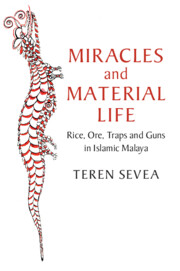Book contents
- Miracles and Material Life
- Asian Connections
- Miracles and Material Life
- Copyright page
- Dedication
- Contents
- Maps and Figures
- Prologue
- Acknowledgements
- Notes on Transliteration
- Abbreviations
- An Introduction
- 1 Compendia of Forest Patois and Agrarian ‘Ilmu
- 2 Pawangs and Munshis in Muhammad’s Ricefields
- 3 The Pawang’s ‘Wonderful Nose’ for Ore
- 4 An ‘Ilmu of Violence
- 5 Gun Gurus and Sufi Shooters
- Conclusion
- Glossary
- Bibliography
- Index
- Asian Connections
4 - An ‘Ilmu of Violence
The Elephant Bomohs of Modern Malaya
Published online by Cambridge University Press: 26 June 2020
- Miracles and Material Life
- Asian Connections
- Miracles and Material Life
- Copyright page
- Dedication
- Contents
- Maps and Figures
- Prologue
- Acknowledgements
- Notes on Transliteration
- Abbreviations
- An Introduction
- 1 Compendia of Forest Patois and Agrarian ‘Ilmu
- 2 Pawangs and Munshis in Muhammad’s Ricefields
- 3 The Pawang’s ‘Wonderful Nose’ for Ore
- 4 An ‘Ilmu of Violence
- 5 Gun Gurus and Sufi Shooters
- Conclusion
- Glossary
- Bibliography
- Index
- Asian Connections
Summary
In 2010, I visited the grave of a seventeenth-century soldier in northern Jakarta. This was the tomb of a Captain Joncor from Maluku. By this time, the grave had become an Islamic miracle-working shrine and an icon of Indonesian resistance to Dutch colonialism. The sight of beer cans and the smell of alcohol at an Islamic shrine might have surprised the uninitiated, but believers knew that the captain demanded regular pints of his favourite beverage. Upon my first visit, I was warned that blood would indiscriminately spill from some part of my body if I did not offer beer to the interred captain. Contemporary historiography portrays Captain Joncor as a decorated soldier of the Vereenigde Oostindische Compagnie (Dutch East India Company, VOC), and Merle C. Ricklefs’s writings on modern Indonesian history describe him as a ‘high-born Muslim’ from the island of Manipa, in the province of Maluku. From 1655, he headed the VOC’s forces that were formed of soldiers recruited from the island of Ambon in Maluku. In August 1689, however, it was discovered that Joncor had conspired with opponents of the VOC and plotted to massacre Europeans in Batavia (Jakarta). As punishment for treason, Joncor was decapitated; his head was displayed in Batavia before his corpse was finally buried in the plot that developed into the Islamic grave littered with beer cans that I visited in 2010.
- Type
- Chapter
- Information
- Miracles and Material LifeRice, Ore, Traps and Guns in Islamic Malaya, pp. 152 - 179Publisher: Cambridge University PressPrint publication year: 2020

